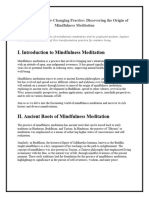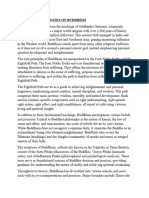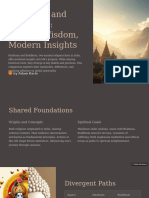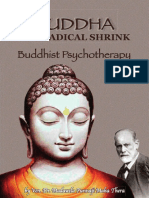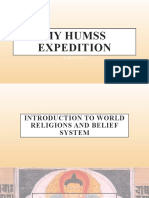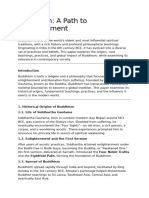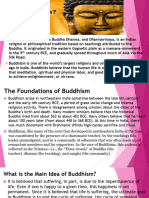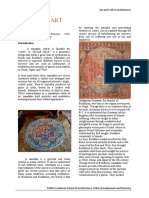Buddhism
Buddhism
Uploaded by
cm4xsz7mpwCopyright:
Available Formats
Buddhism
Buddhism
Uploaded by
cm4xsz7mpwCopyright
Available Formats
Share this document
Did you find this document useful?
Is this content inappropriate?
Copyright:
Available Formats
Buddhism
Buddhism
Uploaded by
cm4xsz7mpwCopyright:
Available Formats
Buddhism, with its roots in ancient India, has evolved into a global spiritual
and philosophical tradition with millions of followers. At its core, Buddhism
is not just a religion but a path to understanding the nature of existence
and achieving liberation from suffering. The teachings of Siddhartha
Gautama, known as the Buddha, form the foundation of Buddhism,
providing guidance on ethical conduct, mental development, and the
attainment of enlightenment.
Central to Buddhist philosophy is the Four Noble Truths, which outline the
nature of suffering (dukkha), its origin, its cessation, and the path leading to
the end of suffering. The Eightfold Path, another fundamental concept,
offers a practical guide for ethical living and mental cultivation. It consists
of right understanding, right intention, right speech, right action, right
livelihood, right effort, right mindfulness, and right concentration.
Buddhism encompasses various traditions and schools, each with its unique
interpretations and practices. Theravada Buddhism, prevalent in Southeast
Asia, emphasizes the original teachings of the Buddha and the pursuit of
individual enlightenment. Mahayana Buddhism, widespread in East Asia,
places greater emphasis on compassion and the idea of the bodhisattva,
one who seeks enlightenment for the benefit of all beings.
Meditation is a central practice in Buddhism, serving as a means to cultivate
mindfulness, concentration, and insight. Various meditation techniques,
such as mindfulness meditation and loving-kindness meditation, are
employed to develop mental clarity, emotional well-being, and a deeper
understanding of the nature of the mind.
Buddhism also incorporates a rich tapestry of rituals, ceremonies, and
artistic expressions. Temples, stupas, and monasteries serve as centers of
worship and education. Rituals, including chanting and ceremonial
offerings, are performed to express devotion and cultivate a sense of
spiritual connection.
The concept of impermanence (anicca), unsatisfactoriness (dukkha), and
non-self (anatta) are foundational to Buddhist thought. These principles
encourage practitioners to develop a detached and insightful perspective
on the transient nature of all phenomena, fostering a profound shift in
consciousness.
Throughout history, Buddhism has spread across Asia and beyond,
adapting to diverse cultural contexts while retaining its core teachings. In
the contemporary world, Buddhism has gained popularity in the West, with
many individuals embracing its teachings as a source of wisdom and
guidance for navigating the complexities of modern life.
Buddhism's emphasis on compassion, mindfulness, and the pursuit of inner
peace has resonated with people seeking spiritual fulfillment and a deeper
understanding of the human experience. The diversity within Buddhism
reflects its ability to offer a flexible and inclusive path that accommodates a
wide range of cultural, philosophical, and individual differences.
In conclusion, Buddhism stands as a profound and enduring spiritual
tradition that addresses the fundamental questions of human existence. Its
teachings on ethical conduct, mental cultivation
You might also like
- 12.origin of Mindfulness MeditationDocument9 pages12.origin of Mindfulness Meditationrodrigo3champalimaudNo ratings yet
- Maha Prajnaparamita Sastra Full by Nagarjuna PDFDocument1,012 pagesMaha Prajnaparamita Sastra Full by Nagarjuna PDFRyan Burton100% (4)
- 14 - Chapter 6 Kilesa-UpakilesaDocument92 pages14 - Chapter 6 Kilesa-UpakilesaDavid Isaac CeballosNo ratings yet
- BuddhismDocument2 pagesBuddhismfederal “mason fitzgerald” entityNo ratings yet
- HistoryDocument14 pagesHistoryAbhinav KumarNo ratings yet
- Rise of BuddhismDocument10 pagesRise of Buddhismsidkaif351No ratings yet
- BuddhismDocument2 pagesBuddhismsgauthamkumarNo ratings yet
- Role and Aspect of BuddhismDocument5 pagesRole and Aspect of BuddhismAnonymous CwJeBCAXpNo ratings yet
- A Sociology Project On World ReligionsDocument15 pagesA Sociology Project On World ReligionsLobsang TamdingNo ratings yet
- Buddha's Footprints: Buddhism in Ancient and Medieval AsiaFrom EverandBuddha's Footprints: Buddhism in Ancient and Medieval AsiaNo ratings yet
- Buddhism: Understanding & Practicing Buddhism to relief Stress and Anxiety (Embracing the Essence of Buddhism with Mindful Habits Calm Your Mind & Stop Over thinking)From EverandBuddhism: Understanding & Practicing Buddhism to relief Stress and Anxiety (Embracing the Essence of Buddhism with Mindful Habits Calm Your Mind & Stop Over thinking)No ratings yet
- Draft Summary Notes On BuddhismDocument4 pagesDraft Summary Notes On BuddhismShanice NyairoNo ratings yet
- Cultural ExperienceDocument11 pagesCultural ExperienceKen WayneNo ratings yet
- Hinduism and Buddhism Ancient Wisdom Modern InsightsDocument7 pagesHinduism and Buddhism Ancient Wisdom Modern Insightsadamkariv28No ratings yet
- BuddhismDocument3 pagesBuddhismJoe KimNo ratings yet
- Hinduism and Buddhism Ancient Wisdom Modern InsightsDocument7 pagesHinduism and Buddhism Ancient Wisdom Modern Insightsadamkariv28No ratings yet
- BuddhismDocument5 pagesBuddhismKissyNo ratings yet
- Asian Ethical TraditionsDocument24 pagesAsian Ethical TraditionsLeo BelserionNo ratings yet
- DHARMICDocument5 pagesDHARMICJosh EsquivelNo ratings yet
- Buddhism and Vipassana Meditation A Scientific MethoDocument28 pagesBuddhism and Vipassana Meditation A Scientific MethoDieu AnhNo ratings yet
- Gel2 Report ScriptDocument4 pagesGel2 Report ScriptDianna PanganibanNo ratings yet
- 11 - Justice - BuddhismDocument25 pages11 - Justice - BuddhismFuriousPhantomNo ratings yet
- Buddhism As A Religion and Philosophical SystemDocument8 pagesBuddhism As A Religion and Philosophical Systemfrom fat to musclesNo ratings yet
- Unleashing TheDocument28 pagesUnleashing TheManish BhardwajNo ratings yet
- History and Background of Budhism As A World ViewDocument3 pagesHistory and Background of Budhism As A World Viewkizzajulius053No ratings yet
- CulturalDocument3 pagesCulturalGalaxy J7plusNo ratings yet
- The Inner Path - History and Philosophy of Mindfulness: Subtitle: Learn about meditation techniques, deal with stress and anxiety, improve your mental and physical health, and live a life of peace.From EverandThe Inner Path - History and Philosophy of Mindfulness: Subtitle: Learn about meditation techniques, deal with stress and anxiety, improve your mental and physical health, and live a life of peace.No ratings yet
- Meditation ResearchDocument5 pagesMeditation Researchapi-294987656No ratings yet
- BUDDHISMDocument11 pagesBUDDHISMRANI MUKHERJEENo ratings yet
- Buddhism ReligionDocument6 pagesBuddhism Religionjahxtow safariNo ratings yet
- Research ProposalDocument2 pagesResearch Proposaldanish.ansariNo ratings yet
- BuddhismDocument5 pagesBuddhismsârmă_smileNo ratings yet
- IKS MiniProjectDocument12 pagesIKS MiniProjectDevesh SuranaNo ratings yet
- The Insights of Buddhists ReligionDocument5 pagesThe Insights of Buddhists Religionselina_kollsNo ratings yet
- Buddhism and Hinduism Comparative AnalysisDocument2 pagesBuddhism and Hinduism Comparative AnalysisAlexandra SarmientoNo ratings yet
- The Meditation Handbook: A Practical Guide to Finding Inner PeaceFrom EverandThe Meditation Handbook: A Practical Guide to Finding Inner PeaceNo ratings yet
- Pol Sci NotesDocument8 pagesPol Sci Notesrashideulkar45No ratings yet
- Teodoro, Alfredo Eugenio G. A51 PLMINDI ALL PAPERSDocument10 pagesTeodoro, Alfredo Eugenio G. A51 PLMINDI ALL PAPERSJuan Carlos JavierNo ratings yet
- Buddha The Radical Shrink - October 2018Document120 pagesBuddha The Radical Shrink - October 2018Ven. Dr. Madawela Punnaji Maha TheraNo ratings yet
- Meditation For Beginners: The Easiest Guide to Cultivate Awareness, Acceptance, and Peace to Unleash Your Inner Strength and Explore the Deepest Realm of Your Being!!From EverandMeditation For Beginners: The Easiest Guide to Cultivate Awareness, Acceptance, and Peace to Unleash Your Inner Strength and Explore the Deepest Realm of Your Being!!No ratings yet
- Philo 101Document9 pagesPhilo 101Niño Franco Azur CatanguiNo ratings yet
- CULMINATINGDocument24 pagesCULMINATINGELaine RazonabLe Eborda CanoyNo ratings yet
- Module 2Document13 pagesModule 2miggyNo ratings yet
- Buddhism Briefly ExplainedDocument51 pagesBuddhism Briefly ExplainedGigapedia GigaNo ratings yet
- Buddhism is broadly divided into two main branchesDocument35 pagesBuddhism is broadly divided into two main branchesbabloo kiratNo ratings yet
- CKKKKKKKKKKKKKKKKKKKK HeyDocument15 pagesCKKKKKKKKKKKKKKKKKKKK HeyGia AlmirañezNo ratings yet
- Espino BuddhismDocument8 pagesEspino BuddhismPaulineNo ratings yet
- Buddhism - G1Document25 pagesBuddhism - G1Romavenea LheiNo ratings yet
- Narrative ReportDocument20 pagesNarrative ReportHazie Tan0% (1)
- Buddhism: The Ultimate Little Book on Buddhism and Enlightenment (A Guide to the Fundamental Beliefs and Traditions of Buddhism, Past and Present)From EverandBuddhism: The Ultimate Little Book on Buddhism and Enlightenment (A Guide to the Fundamental Beliefs and Traditions of Buddhism, Past and Present)No ratings yet
- Mindfulness Cultural Appropriation and T PDFDocument15 pagesMindfulness Cultural Appropriation and T PDFKellerMirellaNo ratings yet
- Buddha PurnimaDocument5 pagesBuddha PurnimaDominiqueHNo ratings yet
- Islamiat Assignment 19th DecDocument8 pagesIslamiat Assignment 19th DecMuhammad Saad RiazNo ratings yet
- Buddhism: Core BeliefsDocument1 pageBuddhism: Core BeliefsJoery BuenconsejoNo ratings yet
- BuddhismDocument5 pagesBuddhismhooman.ghavidelNo ratings yet
- BUDDHISMDocument17 pagesBUDDHISMFlare MontesNo ratings yet
- The Globalization of BuddhismDocument6 pagesThe Globalization of BuddhismJhelian Adil AticaldoNo ratings yet
- BuddhismDocument6 pagesBuddhismjahxtow safariNo ratings yet
- A Glimpse On Bihar and BahilDocument5 pagesA Glimpse On Bihar and BahilNishma GuragaiNo ratings yet
- A Study of The Term Pahātabbā' With Reference To The SabbāsavasuttaDocument129 pagesA Study of The Term Pahātabbā' With Reference To The SabbāsavasuttaBNo ratings yet
- The Net of IndraDocument9 pagesThe Net of IndrasengcanNo ratings yet
- Lojong HandoutsDocument12 pagesLojong HandoutsBruce PashaNo ratings yet
- FinalDocument2 pagesFinalLanka SubodhaNo ratings yet
- Kukai and NshidaDocument24 pagesKukai and Nshidaemmanuel esmillaNo ratings yet
- List of Registered ProjectsDocument218 pagesList of Registered ProjectsJagpreet Singh CheemaNo ratings yet
- Jainism (History Notes For UPSC & Govt. Exams) : Vardhamana Mahavira - LifeDocument9 pagesJainism (History Notes For UPSC & Govt. Exams) : Vardhamana Mahavira - LifeRohit SharmaNo ratings yet
- Sada KaurDocument11 pagesSada KaurKurious missNo ratings yet
- Winds Channels and Drops by Kyabje Garchen Rinpoche - Dharma WheelDocument8 pagesWinds Channels and Drops by Kyabje Garchen Rinpoche - Dharma WheelGian Marco Pantera PietrasantaNo ratings yet
- Dusan Pajin - On Faith in MindDocument29 pagesDusan Pajin - On Faith in MindMarcus IlioskiNo ratings yet
- Serie Orientale Rol//Lh: Istituto Italian0 Per Il Medio Ed Estremo OrienteDocument94 pagesSerie Orientale Rol//Lh: Istituto Italian0 Per Il Medio Ed Estremo OrienteTomaso PignocchiNo ratings yet
- Atisas Teachings On Mahamudra PDFDocument42 pagesAtisas Teachings On Mahamudra PDFGuilherme ErhardtNo ratings yet
- Dukanipātapā I 15A2..Pā I Tipi Aka 18/86Document21 pagesDukanipātapā I 15A2..Pā I Tipi Aka 18/86dhammasocietyNo ratings yet
- Students Name and RollsDocument6 pagesStudents Name and RollsDKDownNo ratings yet
- Deepmala YatraDocument10 pagesDeepmala YatraAnitej SinghNo ratings yet
- Misunderstood in The Experience of Orthodox Sikhs in VancouverDocument17 pagesMisunderstood in The Experience of Orthodox Sikhs in VancouverDr Kuldip Singh DhillonNo ratings yet
- Otsutome: in Praise of Amida BuddhaDocument160 pagesOtsutome: in Praise of Amida BuddhaWen Hui100% (1)
- B.A-1 Sem-1 (Religious Studies-1 Sikh Studies) Email - Bareligionde@Document2 pagesB.A-1 Sem-1 (Religious Studies-1 Sikh Studies) Email - Bareligionde@Karan singh lambserNo ratings yet
- Art and CraftDocument3 pagesArt and CraftAditya BagiNo ratings yet
- A Glossary of Pali and Buddhist Terms in CommonDocument29 pagesA Glossary of Pali and Buddhist Terms in CommonAnna TranNo ratings yet
- The Lion's Roar - SypnosisDocument3 pagesThe Lion's Roar - SypnosisshasandharaNo ratings yet
- Diamond Sutra Vajra Prajna Paramita Hsuan Hua PDFDocument248 pagesDiamond Sutra Vajra Prajna Paramita Hsuan Hua PDFTijana Morača AćimovićNo ratings yet
- The Sangha Traveled Through TheDocument3 pagesThe Sangha Traveled Through TheRashid AliNo ratings yet
- List of Liscenced Colonies, Distt AmritsarDocument18 pagesList of Liscenced Colonies, Distt Amritsar3470070036No ratings yet
- L6 Buddhism and Jainism 1679141719Document60 pagesL6 Buddhism and Jainism 1679141719raj.anshuman316No ratings yet
- Story of Buddha Gautama A Free Full-Color Ebook (Eng. & Chi.)Document94 pagesStory of Buddha Gautama A Free Full-Color Ebook (Eng. & Chi.)Bro. Oh Teik BinNo ratings yet
- Dorje Khadro: Refuge and BodhicittaDocument3 pagesDorje Khadro: Refuge and BodhicittaJigme RabtenNo ratings yet
